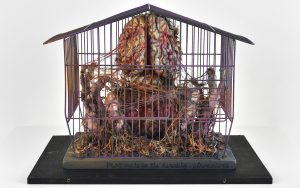“In The Reign of Harad IV” is a fantastical short story that alludes to ideas of craftsmanship, artistry, and the trials that come with these pursuits. Despite the title, the story is focused on a charming, lonely old miniaturist.
 The third-person point of view has a logical voice that resists forthright connotation; this, alongside the workshop setting that is placed in a king’s court, gives the story a fairytale-like feeling. Direct dialogue is also omitted from the story, and only through the narrator’s voice is dialogue described. This omission adds to the format of the story and encourages a focal point towards the miniaturist.
The third-person point of view has a logical voice that resists forthright connotation; this, alongside the workshop setting that is placed in a king’s court, gives the story a fairytale-like feeling. Direct dialogue is also omitted from the story, and only through the narrator’s voice is dialogue described. This omission adds to the format of the story and encourages a focal point towards the miniaturist.
In the beginning of the story, the miniaturist –and the court around him — is bustling. He is in a stage of manic progression of his craft, after his fly and apple creation spurs him onward. This is similar to a bout of intense motivation and inspiration that accompanies the start of a new project or artistic pursuit. The story shifts as the miniaturist becomes more engulfed in his craft. He does not visit with the king nor do apprentices visit him, he recedes into his craft despite the loneliness that ensues. The climax of this shift occurs when he is visited by apprentices, who patronizingly compliment the old man, despite their not being able to actually see what they compliment.
Towards the end of the story the narrator reveals the growing loneliness of the miniaturist, and ends with his life being resigned to strenuousness and hard-work. He has become so enmeshed in his passion that he has grown sour to it, but he must continue his work for the sake of working and finishing his craft.
T he journey of the miniaturist and his art, the first bouts of exhilarating, breathless pursuits that degrade into emotional resignation but steadfast work, is something many artists, academics, or anyone with a passion has experienced. Oftentimes the latter portion is not glamorous, nor meant for outside consumption or observation, it may be limited in its sensibilities, but it is still art (for it was created) nonetheless. The old cliché of ‘do what you love and you never work a day in your life’ comes to mind, and while I am sure (and have witnessed) this to be true for many, the flipside is a recession of burn-out and souring. However, this souring does not influence the passion itself; passions are revered things. Instead, any negative feelings, emotions, or exhaustion are diverted into other realms of being, never aimed towards the thing that both inspires living but is draining of life.
he journey of the miniaturist and his art, the first bouts of exhilarating, breathless pursuits that degrade into emotional resignation but steadfast work, is something many artists, academics, or anyone with a passion has experienced. Oftentimes the latter portion is not glamorous, nor meant for outside consumption or observation, it may be limited in its sensibilities, but it is still art (for it was created) nonetheless. The old cliché of ‘do what you love and you never work a day in your life’ comes to mind, and while I am sure (and have witnessed) this to be true for many, the flipside is a recession of burn-out and souring. However, this souring does not influence the passion itself; passions are revered things. Instead, any negative feelings, emotions, or exhaustion are diverted into other realms of being, never aimed towards the thing that both inspires living but is draining of life.